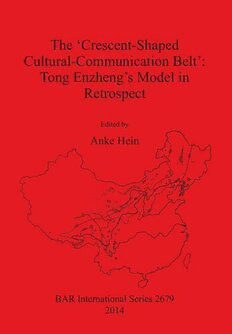
The 'Crescent-Shaped Cultural-Communication Belt': Tong Enzheng's Model in Retrospect: An examination of methodological, theoretical and material concerns of long-distance interactions in East Asia PDF
152 Pages·2014·17.938 MB·English
Most books are stored in the elastic cloud where traffic is expensive. For this reason, we have a limit on daily download.
Preview The 'Crescent-Shaped Cultural-Communication Belt': Tong Enzheng's Model in Retrospect: An examination of methodological, theoretical and material concerns of long-distance interactions in East Asia
Description:
The notion of a "crescent-shaped cultural-communication belt" stretching from Northeast China and Korea along the Tibetan borderlands all the way to Yunnan stands as the late Tong Enzheng's most-cited contribution to the Chinese archaeological discourse (Tong Enzheng 1987). In the 1980s, suggesting such long-distance contact was a bold move. At the time, Chinese and Western scholars alike were afraid of being accused of diffusionistic tendencies in their work, and they thus mostly decided to concentrate on local developments. Only in recent years has it again become acceptable and even desirable to discuss far-reaching exchange networks. Interestingly, the emerging scholarship on such topics has some noticeable lacunae. Discussions on China's long distance contacts, for instance, focus mostly on steppe connections and Western influences on the cultures of the Central Plains. By contrast, material from Southwest China has received much less attention and has but rarely been mentioned in connection with Northeast China; neither have Tong Enzheng's considerable theoretical contributions to the understanding of culture contact and cultural exchange received the consideration they deserve. While Tong Enzheng remains a household name to anyone working in the Southwest, in other parts of China his work is less well known, and even though Tong still carries some name recognition outside of China, few scholars are fully aware of his important contributions. This volume stems from the session "Reconsidering the Crescent-Shaped Exchange Belt — Methodological, Theoretical and Material Concerns of Long-Distance Interactions in East Asia Thirty Years after Tong Enzheng" held at the Fifth World Conference of the Society for East Asian Archaeology (SEAA), held in Fukuoka (Japan) in 2012. The papers collected in the present volume touch on four main topics: Tong Enzheng's life and research, and his place within the development of modern Chinese archaeology; recent developments in the archaeology of Southwest China; material traces and geographic, cultural, and historical preconditions of possible movements and inter-group contacts along Tong's crescent shaped cultural-communication belt; and theoretical and methodological issues in the study of culture contacts and cultural exchange, and of their reflections in the material record.
See more
The list of books you might like
Most books are stored in the elastic cloud where traffic is expensive. For this reason, we have a limit on daily download.
